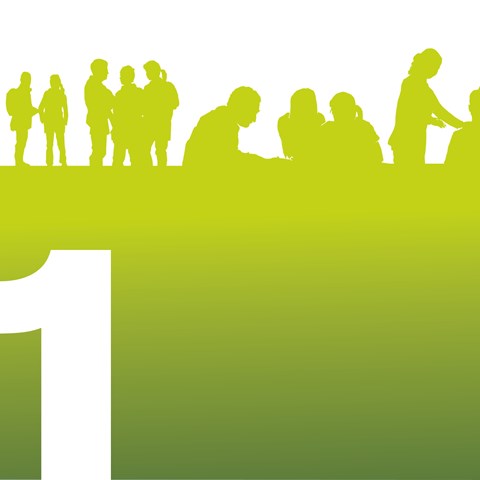Facts:
* Transdisciplinarity entails the crossing of boundaries between and beyond disciplines and the integration of knowledge and perspectives from various scientific disciplines as well as non-scientific sources.

Through high-quality education, research and environmental monitoring and assessment, SLU has the capacity to assert itself as a university that makes a real difference in the transition to a sustainable society. Thanks to our specific knowledge of the conservation and sustainable use of natural resources, we can cooperate with others to support and drive the transition necessary in order to achieve the global sustainable development goals of Agenda 2030.
Overall objective:
In a changing world, SLU is a world-class university that plays a key role in the transition to a sustainable society.
Activities for focus area 1 (in Swedish, pending translation to English)
Subcomponents:
a) SLU’s degree programmes recruit enough qualified students and doctoral students to meet the needs of a sustainable society.
b) There is an increased demand for scientifically based knowledge and decision-making data from SLU.
c) SLU is an attractive cooperative partner and driving force for the green transition of industry and other parts of society.
d) The ability to adopt a system perspective and to integrate all sustainability dimensions has been developed.
e) SLU leads the way by conducting ambitious internal sustainability work that includes all sustainability perspectives.
Meaning:
High-quality education, research and environmental monitoring and assessment are our strengths. By developing and making even better use of them, SLU's role in the transition to a sustainable society is enhanced. We will use our own activities as a test bed and example and continue to develop our collaboration with other societal actors.
Both in Sweden and globally, many more trained professionals are needed to create solutions for the transition to a sustainable society. SLU has a unique profile and educates students so that they can contribute to the sustainable management of Earth's production systems and natural environments, as well as the development of urban environments. It is therefore important that SLU receives an expanded educational mandate from the Swedish Government, and that students are recruited from all parts of the population. SLU must also succeed in recruiting more international students. When students and doctoral students graduate from SLU, they should carry with them knowledge and tools that they can use, both in their future professional lives and as citizens of society, in order to actively contribute to the transition to a sustainable society.
Through strong research links and well- developed cooperation with external stakeholders, we will ensure that our degree programmes address the future issues that are relevant to professional life and society. In order to meet the rapid pace social change, people who are already gainfully employed must have opportunities to absorb research-related knowledge. SLU has a special responsibility for lifelong learning in the areas described in our instructions (SFS 1993:221).
SLU shall strive to obtain more high-quality environmental monitoring and assessment assignments that strengthen its own operations and cause SLU to become more relevant and recognised. We shall also contribute to the development of an in-depth understanding of how scientifically and artistically based knowledge can spark processes of change in society. Open knowledge sharing and well- developed communication are important to the dissemination of research findings and environmental data, which thus become more useful to sustainable societal development efforts at the local, national and global level. (See Focus Area 3.2).

While safeguarding scientific integrity, SLU shall actively help to find solutions to societal problems. We have a particular responsibility to contribute to the sustainable transition and development of our sectors, including those commonly referred to as ‘green industries’ (see the regulation text on page 3). Cooperation with stakeholders shall be further developed and broadened to encompass new areas. Our campus environments shall be used as meeting places that stimulate cooperation related to knowledge development, innovation and entrepreneurship. In keeping with the policy governing SLU’s contributions to the globalimplementation of Agenda 2030, we shall continue to develop international partnerships, including collaborations which aim to foster capacity development in low-income countries. Doctoral theses contribute to global knowledge development within SLU’s areas. SLU graduates shall be internationally competitive in their ability to conduct research, development work and problem- solving efforts in all sectors of society.
SLU shall increasingly produce knowledge and deliver decision-making data on complex issues that may entail various conflicting objectives. The breadth and depth of SLU’s research and environmental monitoring and assessment are essential to our knowledge of sustainability issues. However, in order to contribute more clearly to the achievement of the global sustainable development goals, we must increase our ability to adopt a systemic perspective and to integrate ecological, social and economic dimensions. Through numerous new working methods that also stimulate transdisciplinary* approaches, we shall strengthen the ties between research topics (both present and future) at the university.
Through its lofty aspirations regarding the sustainability of its own organisation, SLU can lead the way for other public authorities. In our efforts to become a climate-neutral university that simultaneously maintains a high level of productivity and protects biodiversity in our own agriculture and forestry, SLU’s internal sustainability work shall be based on knowledge and facts. In SLU's land use and development of campus environments, knowledge about environments that foster human well-being and health shall contribute to expanded sustainability perspectives. Trained managers and leaders shall set a positive example by focusing on the promotion of sustainable working life. SLU shall promote a sustainable student environment by consistently taking into account the student perspective on various issues and continually developing student influence.
* Transdisciplinarity entails the crossing of boundaries between and beyond disciplines and the integration of knowledge and perspectives from various scientific disciplines as well as non-scientific sources.